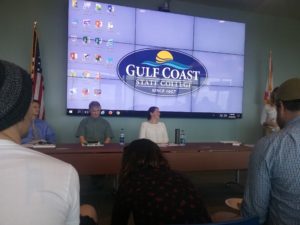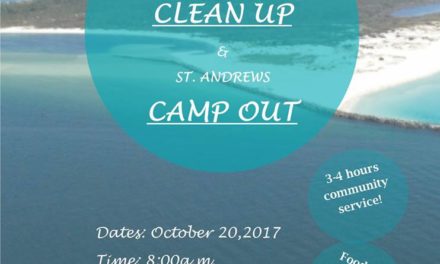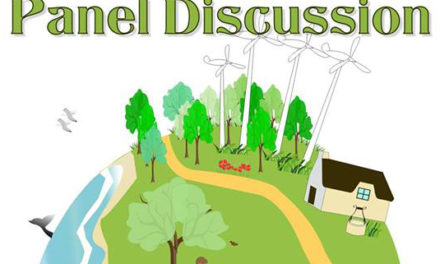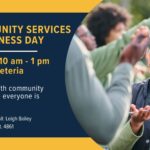Government and Environment Panel Discussion

The Government and Environment Panel Discussion is a meeting of three representatives, mostly professors, here to talk about the growing environmental issues. This ranges from problematic bills becoming laws, the loss of local control, lack of recycling, and laws that are being passed without letting the public know.
Meeting the Spokespersons
At the panel, we have Dr. Jessica Edwards who works at the National Science division and teaches Chemistry and Physics. She’s an advisor of Gulf Coast Green Club, promoting and raising awareness of being more environment-friendly.
Next spokesperson is Dr. John Ackerman, who was a secretary of the St. Andrew Bay Resource Management Association. He’s a political science professor who teaches online courses for Ashford University.
Lastly, there’s Professor Jamie Webb who is a current professor here in Gulf Coast State College. He teaches oceanography, geology, earth science, and other science-related classes. He spent 15 years as a professor and 13 years as an environmental deviation consultant.
Dumping Water into Aquifers
Each spokesperson were given copies of state bills brought up by the state legislature. The House Bill 1149 summarizes that the Department of Environmental Protection and water management districts wishes to re-inject waste water into the aquifers. He stated that the waste water contains dissolved illegal drugs and harmful contaminants. The waste, unfortunately, won’t be treated by the aquifer, but instead would cause harm to the ecosystem.
He feared that tossing stagnant waste water would accumulate into drinkable water, which would later contaminate the state’s water supply. Fortunately, the governor vetoed the bill two days after Webb’s discovery.
Privately-Owned Beaches
The next bill Dr. Webb explains is if anybody comes above the high tide line at the beach and if you don’t own that property, you’re trespassing. This means hotels, condos, and private residences can prohibit anybody who comes above the high tide line.
The beach belong to everyone, but this bill could negatively affect tourism. Nobody should be kicked out of the beach, and this bill removes the power from local hands for private owners. Many have payed in tax dollars for beach maintenance, however we won’t have access to cross over certain parts of the beach. This could potentially harm the economy, denying the right for tourists to walk on certain beach parts.
One person in the audience asked if this bill will have privately-owned beaches enforced by police officers or other means of security. Dr. Ackerman said that private beaches won’t be enforced, but tourists must be a hotel resident to use the beach. He even stated that they’ve started marking the beach to separate the private parts from the public remnants.
Laws under our noses
Another attendee asked why the bill has never been brought to the limelight. Dr. Edwards said it’s the responsibility of the citizens to know about these bills beforehand. The state government rarely tells what bills are up in the air because they barely tell the public until one passes. She never knew about the bill until Professor Webb told her.
The internet’s there to help us know more about the bills in process, but we have to find what website to go to for information. There once was a time when our state government would read bills to us, but now there are laws being made under our noses intentionally. They don’t talk about it, and they assumed we don’t care about what’s going on politically or too busy to notice the changes. It’s our responsibility as citizens to search and learn what laws they’re passing.
There are many ways citizens can prevent the state legislature from passing shady laws. One can go to a specific website and call their representatives about how they disapprove the new bill. Another way is to vote who do you want in office, picking the right people can make a massive difference when it comes to lawmaking. Citizens need to know what’s going on within the state legislature so they can find a way to stop potentially harmful bills from becoming laws.
Where do we recycle?
Stephanie, the current president of SGA, asked the three of the lack of recycling bins around school campus. There are students that want to recycle, but nobody wants to take any responsibility or pay for it. She even mention the giant bottle-shaped bins where students can stick coke bottles in there. Stephanie thought it would be a neat suggestion to go through with this idea if they’re willing to spend $40 a month to have them around.
During my time here in Florida, I’ve seen the lack of recycling all across Bay County. There’s no containers to stash in plastic, paper, and metal. Everything’s thrown together in one large garbage bag and later thrown into the incinerator.
Especially here in GCSC, I found supposed recycling bins within the ATC, but it all leads to trash. There’s no reason to have these bins there if they’re used solely for trash and not recyclables as it meant to be.
Even if the price is hefty, it’s a good start to get students to finally recycle. The campus community needs to get the ball rolling in not only getting everyone to recycle, but also start recycling programs to make our campus cleaner and greener.
Conclusion
The issues discussed here at the panel are legitimate problems. It’s the citizen’s responsibility to act out against shady legislature business rather than watch everything burn before their eyes. Everyone’s doing the best they can to preserve their rights without the state government telling them how they should live.
ABOUT THE AUTHOR
Michael Lopez
Student Author - Spring 2018






